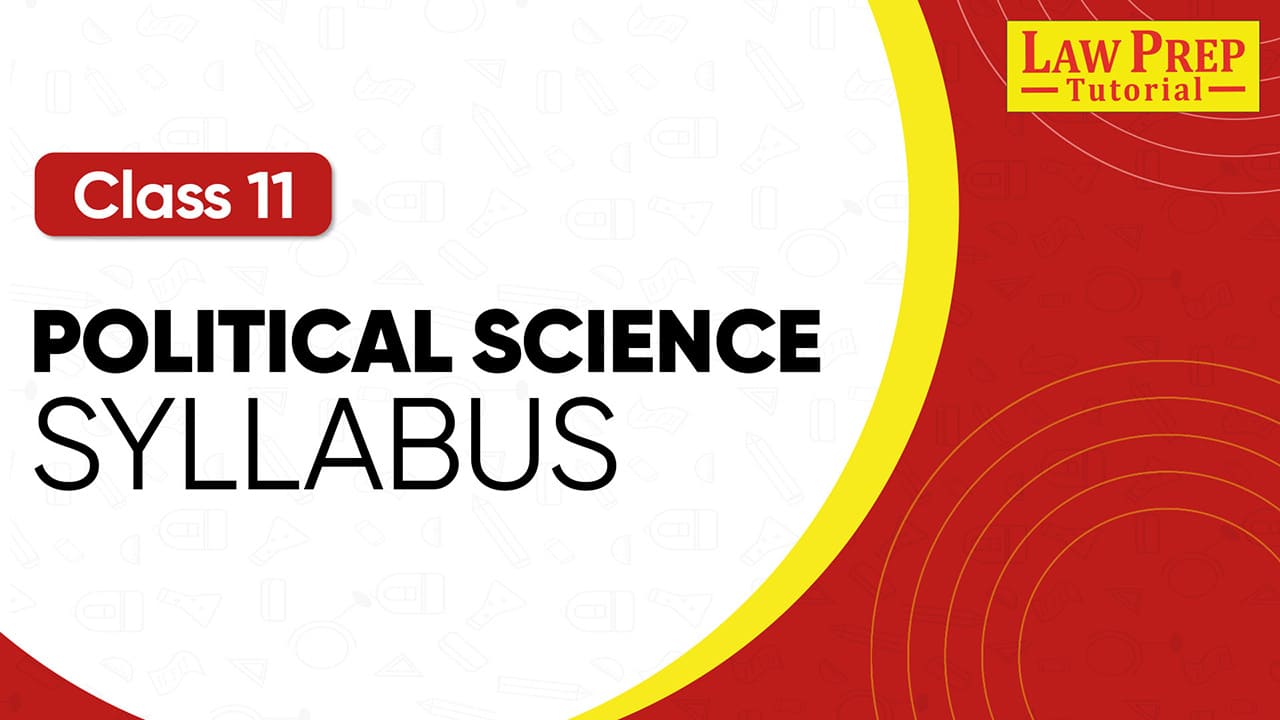Political Science in Class 11 gives you a deep understanding of how the Indian Constitution works and the basic principles of political theory. The Class 11th Political Science syllabus 2026-27 prescribed by CBSE is divided into two parts – Indian Constitution at Work and Political Theory.
These sections cover essential topics like rights, justice, equality, liberty, and the working of institutions in a democracy. Studying this subject helps you build a foundation for higher studies in law, political science, public administration, and also prepares you for competitive exams like CLAT, CUET, and UPSC.
Class 11th Political Science Syllabus 2026-27: Overview
Find the summary of political science syllabus in class 11th:
| Part | Units/Content | Marks |
| Part A – Indian Constitution at Work | – Constitution – Rights – Election & Representation – Executive – Legislature – Judiciary Federalism – Local Governments – Constitution as a Living Document – Political Philosophy | 40 |
| Part B – Political Theory | – Political Theory: An Introduction – Freedom – Equality – Justice – Rights – Citizenship – Nationalism – Secularism – Peace – Development | 40 |
| Project/Practical Work | Any one project activity | 20 |
| Total | – | 100 |
📥 Download Class 11 Political Science Syllabus PDF!
Download the complete CBSE Class 11 Political Science Syllabus 2026-27 PDF with unit-wise details, marks distribution, and project guidelines exactly as issued by CBSE.
Class 11 Political Science Syllabus: Part A
Part A – Indian Constitution at Work:
This part of class XI political science syllabus covers the Indian Constitution, its making, rights, values, and institutional framework. Students learn about elections, executive, legislature, judiciary, federalism, and local governments.
It also explores how the Constitution evolves as a living document and the philosophy behind it, strengthening democratic citizenship and critical understanding of governance.
| Chapter No. | Chapter Name | Topics Covered |
| 1 | Constitution: Why and How, Philosophy of the Constitution | • Making of the Constitution • Salient features • Role of Constituent Assembly • Philosophy and values |
| 2 | Rights in the Indian Constitution | • Fundamental Rights • Directive Principles • Fundamental Duties • Importance of rights in democracy |
| 3 | Election and Representation | • System of elections • Representation of people’s act • Electoral system in India |
| 4 | The Executive | • President and Prime Minister • Council of Ministers • Role and powers of executive |
| 5 | The Legislature | • Parliament structure • State legislatures • Law-making process • Role of legislature in democracy |
| 6 | The Judiciary | • Structure of Indian judiciary • Independence of judiciary • Judicial review • Judicial activism |
| 7 | Federalism | • Federal structure • Division of powers • Centre-state relations |
| 8 | Local Governments | • 73rd and 74th Amendments • Panchayati Raj institutions • Urban local bodies |
| 9 | Constitution as a Living Document | • Constitutional amendments • Judicial interpretations • Changing needs of society |
| 10 | The Philosophy of the Constitution | • Democratic values • Liberty, equality, justice • Guiding principles of the Constitution |
More Important Resources for CBSE Exam:
| Class 11th Hornbill Syllabus | CBSE Class 11th Commerce Subjects |
| CBSE Full Form | All about CBSE Class 11th |
| Class 11th Syllabus | Class 12th Syllabus |
| Class 11th Commerce Books | CBSE Board: All details |
Class 11 Political Science Syllabus: Part B
Part B – Political Theory:
This part of class 11th political science syllabus introduces students to major themes in political theory. It covers freedom, equality, social justice, rights, citizenship, secularism, and peace. Each chapter explains key concepts, debates, and their relevance to society.
The syllabus builds critical thinking about democracy, justice, and values while linking ideas to India’s lived realities.
| Chapter No. | Chapter Name | Topics Covered | Marks |
| 1 | Political Theory: An Introduction | • Importance of political theory • Relevance to society • Normative vs empirical theory | 4 |
| 2 | Freedom | • Meaning and dimensions of freedom • Positive and negative liberty • Safeguards of freedom | 12 |
| 3 | Equality | • Concept of equality • Political, economic, social equality • Affirmative action | – |
| 4 | Social Justice | • Meaning of justice • Distributive justice • John Rawls’ theory • Social justice in India | 6 |
| 5 | Rights | • Meaning and kinds of rights • Human rights • Political rights in democracy | 4 |
| 6 | Citizenship | • Concept of citizenship • Universal vs differentiated citizenship • Rights and responsibilities | 8 |
| 7 | Nationalism | • Meaning and forms of nationalism • Liberal and cultural nationalism • Indian experience | – |
| 8 | Secularism | • Meaning of secularism • Indian vs Western model • Importance of secularism | 6 |
| 9 | Peace | • Concept of peace • Gandhian perspective • Conflict resolution | – |
Project Work
- Any one project activity to be undertaken.
- Weightage: 20 Marks.
Class 11 Political Science Syllabus: Exam Pattern
Marks Distribution
| Part | Marks |
| Part A – Indian Constitution at Work | 40 |
| Part B – Political Theory | 40 |
| Project Work | 20 |
| Total | 100 |
Theory Question Paper Design (80 Marks)
| Typology of Questions | Learning Outcomes | Marks | Weightage % |
| Remembering & Understanding | Recall of facts, concepts, principles, and explanation of ideas | 24 | 30% |
| Application | Use of knowledge, facts, principles in new situations, map/diagram interpretation | 24 | 30% |
| Analysis, Evaluation & Creativity | Compare, contrast, evaluate, and interpret political processes/issues | 24 | 30% |
| Map/Diagram/Interpretation Work | Interpretation-based questions, map-based, or data analysis | 8 | 10% |
| Total | – | 80 | 100% |
Project Work (20 Marks)
| Component | Marks |
| Relevance of the topic | 4 |
| Knowledge Content/Research Work | 6 |
| Presentation Technique | 4 |
| Viva Voce | 6 |
| Total | 20 |
Check the latest CBSE Class 11 syllabus for all subjects below:
Suggested Project/Activity Work for Class 11 Political Science
As part of the CBSE Class 11 Political Science syllabus, students must complete one project carrying 20 marks. The project aims to encourage independent research, application of political concepts, and critical thinking.
Suggested Topics for Project Work:
- Study of the making of the Indian Constitution and role of the Constituent Assembly.
- Analysis of Fundamental Rights and Directive Principles with examples from recent cases.
- Case study on Elections in India: voting behaviour, role of Election Commission, or electoral reforms.
- Role and powers of the President, Prime Minister, and Council of Ministers in India.
- Functioning of the Indian Parliament and comparison with state legislatures.
- Study of the Judiciary in India: landmark judgments and judicial activism.
- Case study on Federalism in India: Centre-State relations.
- Role and significance of Panchayati Raj institutions and local governments.
- Project on Secularism in India: challenges and practices.
- Nationalism in India: historical evolution and present-day challenges.
- Study of Citizenship and Rights in the Indian context.
- Survey on student perspectives about freedom, equality, and justice in daily life.
- Project on Democracy and Peace: Gandhian perspective and conflict resolution.
Objectives of Class 11 Political Science Syllabus 2026-27
The CBSE Class 11 Political Science syllabus aims to introduce learners to the foundations of politics, democracy, and the Indian Constitution. It is designed to develop conceptual clarity, analytical skills, and civic responsibility.
The key objectives are:
1. Understanding the Constitution and Democracy
To familiarize students with the making, features, and working of the Indian Constitution and democratic institutions.
2. Learning Political Concepts and Theories
To introduce core ideas like freedom, equality, justice, rights, secularism, and peace in political theory.
3. Building Analytical and Critical Thinking
To develop the ability to analyze political events, government policies, and social issues using political principles.
4. Promoting Civic Awareness
To help learners recognize their rights and duties as citizens and understand the importance of participation in democracy.
5. Linking Theory with Real Life
To connect classroom knowledge with contemporary political issues such as elections, federalism, and governance challenges.
6. Encouraging Tolerance and Diversity
To promote respect for diversity, pluralism, and peaceful coexistence in a democratic society.
7. Preparing for Higher Studies and Careers
To lay a strong foundation for advanced studies in Political Science, Law, Public Administration, and preparation for exams like CUET, CLAT, and UPSC.
Read the chapter-wise summaries of Class 11 English here:
Tips to Prepare for Class 11 Political Science Syllabus
- Read NCERT Textbooks Thoroughly: Stick to the prescribed NCERT books. Every exam question is based on them, so avoid skipping chapters.
- Make Short Notes: Prepare notes with headings, subheadings, and bullet points. Highlight key terms like rights, justice, or federalism for quick revision.
- Understand, Don’t Memorize: Instead of rote learning, focus on understanding political concepts and their real-life applications. Use current events as examples.
- Practice Answer Writing: Frame answers in points with clear structure—introduction, explanation, and conclusion. Include relevant examples and case studies.
- Revise Regularly: Revise units weekly. Political Science has conceptual depth, so repeated revision strengthens memory and analysis.
- Focus on Case Studies & Examples: Link theory with practical examples like elections, Supreme Court judgments, or constitutional amendments. This improves answer quality.
- Don’t Ignore Political Theory: Theory chapters like freedom, equality, and justice are conceptual and scoring. Practice writing short and long answers from these.
- Solve Previous Year Papers & Sample Papers: Practice CBSE sample papers and past year papers to understand the paper pattern and improve time management.
Prescribed Books for Class 11th Political Science Syllabus
- Indian Constitution at Work: Class XI, NCERT
- Political Theory: Class XI, NCERT
These NCERT textbooks are the only prescribed books for Class 11 Political Science. All questions in the CBSE board exam are strictly based on these books, making them essential for preparation.
Students should also refer to the in-text questions, case studies, and exercises at the end of each chapter for better practice.
FAQs About Class 11 Political Science Syllabus
There are 19 chapters in total: 10 in Indian Constitution at Work and 9 in Political Theory.
Part A is Indian Constitution at Work, which covers Constitution, Rights, Elections, Executive, Legislature, Judiciary, Federalism, Local Governments, and Constitutional Philosophy.
Part B is Political Theory, which explains key concepts like freedom, equality, justice, rights, citizenship, nationalism, secularism, and peace.
The paper has three sections: remembering & understanding (30%), application (30%), and analysis/evaluation/creativity (30%), plus 10% weightage to map/diagram/data interpretation.
Yes, project work carries 20 marks. Students need to complete one p[roject on topics like Constitution, elections, or democracy.
No, it is a conceptual subject. With proper reading of NCERT and practice, the cbse political science class 11 syllabus is scoring.
Indian Constitution at Work carries 40 marks in the theory paper.
Chapters on Rights, Executive, Legislature, Judiciary, Freedom, and Social Justice are considered high-weightage and scoring.
Yes, it forms the base for exams like CUET, CLAT, and UPSC, as it covers Constitution, rights, justice, and democracy.
Yes, NCERT is sufficient for Class 11 Political Science as CBSE strictly bases questions on the prescribed books.
Find detailed questions and answers from all chapters of English Class 11 now:
Explore the updated CBSE Class 12 syllabus for all subjects here:
Discover CLAT exam resources that can help you get started early:
Explore CLAT coaching centers across different cities:


